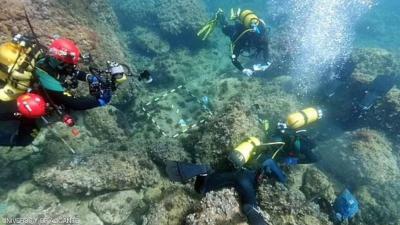By pure chance, a team of amateur divers discovered one of the largest collections of Roman gold coins in Europe during their vacation off the coast of Spain. According to the "Daily Mail," it is believed that the gold coins were hidden from barbarian invaders about 1,500 years ago and were uncovered by two young men who were cleaning trash from the seabed in the Alicante region. Despite being at the bottom of the sea since the late 4th and early 5th centuries, the 53 gold coins were intact and in "perfect preservation." Jaime Molina from the University of Alicante stated, "This is one of the largest collections of Roman gold coins found in Spain and Europe." He added, "It is an exceptional archaeological and historical discovery, as its achievement could provide a wealth of new information for understanding the final stage of the fall of the Western Roman Empire."
The brothers, Luis Lins and Cesar Gimeno, stumbled upon this extraordinary discovery at a depth of seven meters off the coastal city of Xábia. One of the young men told local media, "At first, I found one coin; I thought it was a regular 10-cent coin." However, after returning to their boat and taking a closer look, he noticed "an ancient image, like a Greek or Roman face" engraved on the coin, and immediately realized it was historical. Subsequently, the young men returned to the site and spent two hours using a key and Swiss knife to search for the remaining treasure. Specialists from the University of Alicante identified the faces shown on the coins, which included the Roman emperors Valentinian I, Valentinian II, Theodosius I, Arcadius, and Honorius. One of the young men remarked, "There are no remains of sunken ships in the area where the coins were found, so it’s likely they were intentionally hidden by the Romans to prevent the barbarians from reaching them."




